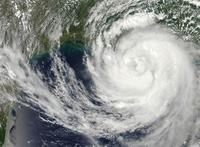-
Hurricane Isaac tests Loyola University's emergency response plans
In the days following Hurricane Isaac’s slow march across south Louisiana, Loyola University New Orleans administrators have been reviewing their response with a critical eye to ensure emergency preparations continue to evolve and meet the demands of each situation; beginning Tuesday, 28 August, New Orleans felt the first of Isaac’s high winds and heavy rains – but Loyola University was ready
-
-
Questions raised about cost, reliability of BioWatch upgrade

One year ago, DHS said a new contract for Biowatch, a system for detecting biological attacks on the United States, would be awarded in May 2012 and would cost an estimated $3.1 billion during its initial five years of operation; now DHS has decided to postpone the plans due to concerns about cost and reliability
-
-
Government considering options for post-biolab Plum Island

The Plum Island biolab, located on an 840-acre island of the tip of Long Island, has always been shrouded in mystery owing to the sensitive nature of the biological research done in its high-security facilities; now the center is being shut down by DHS, and the government is considering several options regarding what should be done on the island and the research facility
-
-
Netanyahu cancels security cabinet meeting on Iran after leaks

Israel’s prime minister, Benjamin Netanyahu, scheduled a 2-day marathon meeting of Israel’s security cabinet for Tuesday and Wednesday, with an 8-hour session planned for each day; the 2-day meeting was called for a thorough and comprehensive – and probably decisive — discussion of Iran’s nuclear weapons program and what should Israel do about it; the speakers on Tuesday included the directors of Israel’s military and civilian intelligence agencies; early Wednesday, Netanyahu abruptly canceled the meeting’s second session because of leaks from Tuesday top-secret meeting session appeared in the Israeli press
-
-
DHS funds more tests of autonomous power buoy for ocean surveillance

Ocean Power Technologies (OPT) has entered into an agreement with DHS Science & Technology Directorate to perform a new round of in-ocean tests on the company’s Autonomous PowerBuoy to demonstrate its use for ocean surveillance
-
-
DHS in settlement talks with employee who charged that ICE was being run “frat style”

DHS has entered into settlement talks with James Hayes, the head of New York ICE office, following a suit filed by Hayes against DHS secretary Janet Napolitano and ICE; the suit charged two female executives at ICE with turning the agency into a “frat house,” and with discrimination against male employees of the agency
-
-
Cloud OS for the U.S. intelligence community
Cloud management specialist Adaptive Computingis partnering with the investment arm of the CIA, In-Q-Tel, to develop a cloud operating system for use by U.S. intelligence agency
-
-
Assassination attempt on Quebec’s premier-elect foiled
A man shouting “The Anglos are waking up” broke into a victory party held by Pauline Marois, Quebec’s premier-elect and the leader of the separatist Parti Quebecois (PQ), after the party won the provincial election on Tuesday; the gunman missed Marois but killed one man and wounded two others; the PQ emerged as the largest party in the province, but it failed to win an outright majority; its minority government status means that it will not be able to push for a referendum on Quebec’s independence from Canada
-
-
Law-enforcement agencies eager for Web-surveillance tools

Private technology firms are pitching software capable of analyzing large swaths of the Internet to local law enforcement looking for ways to stop the next mass shooting or domestic terrorist event before it happens; police departments hope the software will help them detect online information from terrorists, traffickers, pedophiles, and rioters
-
-
Janet Napolitano named in two lawsuits
DHS secretary Janet Napolitano is under fire for two very different reasons as she is named in two separate lawsuits; the first lawsuit charges that two women executives Napolitano brought to DHS have mistreated male employees at the department; the second suit, brought by several ICE agents, charges that the administration’s deferred deportation executive order, which went into effect 15 August, force the agents face difficult choices while performing their tasks
-
-
House panel charges DHS overstates deportation figures
A House committee says the administration inflates the number of illegal aliens it has deported in 2011 and 2012; the committee says the administration is able to cite larger numbers of deportees by including numbers from the Alien Transfer Exit Program (ATEP) in the administration’s year-end removal numbers; if the number of ATEP-removed individuals is subtracted from ICE-deported individuals, then the annualized number of deportees in 2011 and 2012 would lower – rather than higher – than the number of deportees in 2008 and 2009
-
-
Many of the U.S. 20 million manholes are in need of immediate rehabilitation or replacement

The EPA estimates that there are about twenty million manholes in the United States – or one manhole for every 400 feet of pavement on average; many of those manholes are in serious decay or in need of immediate rehabilitation or replacement
-
-
MIT expert: “toxic” political discussions limit climate response
In a talk at the Sandia National Lab, an MIT expert says the inability of natural and social scientists to convince political leaders that “we’re spinning a roulette wheel over climate change” puts humanity at “extreme risk,” and that the difficulties in using science to push for mitigation strategies are more political than scientific
-
-
Storing government records for generations to come
A White House directive released last week requires that federal agencies adopt systems which will store and manage all electronic records in order to keep them safe and secure for future generations
-
-
As Hurricane Isaac beats on New Orleans, new infrastructure is holding up

This week, as Hurricane Isaac was threatening to replicate the physical damage that Katrina inflicted, it has become apparent that $14 billion worth of changes and improvements in infrastructure, planning, and emergency response procedures have given the city of New Orleans and the Gulf states the ability to withstand the worst of the storm
-
More headlines
The long view
Preventing Another 'Jan. 6' Starts by Changing How Elections Are Certified, Experts Say
The 2024 presidential election may be a rematch between President Joe Biden and former President Donald Trump, but preventing a repeat of Jan. 6, 2021 — when false claims of a stolen election promoted by Donald Trump and his allies led to an insurrection at the U.S. Capitol —will be top of mind this election year. Research finds broad support among public for nonpartisan certification commissions.
States Rush to Combat AI Threat to Elections
This year’s presidential election will be the first since generative AI became widely available. That’s raising fears that millions of voters could be deceived by a barrage of political deepfakes. Congress has done little to address the issue, but states are moving aggressively to respond — though questions remain about how effective any new measures to combat AI-created disinformation will be.
Chinese Government Hackers Targeted Critics of China, U.S. Businesses and Politicians
An indictment was unsealed Monday charging seven nationals of the People’s Republic of China (PRC) with conspiracy to commit computer intrusions and conspiracy to commit wire fraud for their involvement in a PRC-based hacking group that spent approximately 14 years targeting U.S. and foreign critics, businesses, and political officials in furtherance of the PRC’s economic espionage and foreign intelligence objectives.
European Arms Imports Nearly Double, U.S. and French Exports Rise, and Russian Exports Fall Sharply
States in Europe almost doubled their imports of major arms (+94 per cent) between 2014–18 and 2019–23. The United States increased its arms exports by 17 per cent between 2014–18 and 2019–23, while Russia’s arms exports halved. Russia was for the first time the third largest arms exporter, falling just behind France.
LNG Exports Have Had No Impact on Domestic Energy Costs: Analysis
U.S. liquified natural gas (LNG) exports have not had any sustained and significant direct impact on U.S. natural gas prices and have, in fact, spurred production and productivity gains, which contribute to downward pressure on domestic prices.
Don’t Buy Moscow’s Shameless Campaign Tying Biden to Its Terrorist Attack
Russia has offered many different explanations to the ISIS-K’s 22 March 2024 terrorist attack at the Crocus City Hall in Moscow, but the most recent explanation offered by Russia is the most audacious yet: Russia now charges that the Ukrainian energy company Burisma financed the attack. Burisma is at the center of an effort by a congressional committee to impeach President Biden, but the case has all but collapsed. Hunter Stoll writes that Russia’s disinformation and propaganda apparatus appears to be searching for ways to keep Burisma in the news ahead of the U.S. presidential election.
